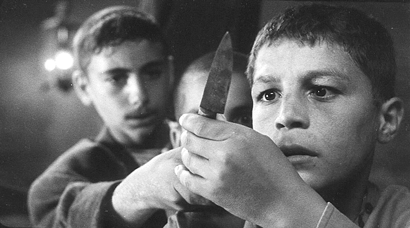Syrian cinema comes out swinging at the Walter Reade
As the tempest blows over Tribeca, a quiet storm is brewing at the scaffolding-corseted Walter Reade with a panorama of Syrian films, one of the national cinemas yet to enjoy its 15 minutes.
Programmed with care and discernment by Rasha Salti and Livia Alexander of ArteEast, presenters of the ongoing CinemaEast series, “The Road to Damascus: Discovering Syrian Cinema” has a fetching scale, skimming a broad historical swath into a fortnight topped with a shorts compilation and a free panel discussion with visiting filmmakers on Sunday, May 7.
But why Syrian cinema, when so many more predictable satisfactions vie for your movie coin? “Road to Damascus” has been gestating for a while, but the timing is apt since a multiplicity of windows onto Syrian reality are needed to offset the Bush regime’s propaganda mill and lunatic aggression; isolating Syria between a newly colonized Iraq and Israel was a strategic Pentagon objective well prior to the March 2003 Iraq invasion.
The Syrian government of Bashar al-Asad, legatee to his father Hafez’s 30-year Ba’athist party rule, today confronts daunting challenges politically, socially, and environmentally, and the national cinema—centralized through an old-school, overtly ideological state film bureaucracy—is an admittedly marginal but beguiling terrain from which these tensions seethe in sometimes unexpectedly ravishing style.
“Sacrifices,” by Oussama Mohammad, is an allegorical epic of a patriarch who dies without naming a successor, and the terrible conflicts that result among the families of his three heirs. One of the scions develops a pronounced authoritarian temperament, and Mohammad at one point lingers on a visual tableau conflating the troubled youth with al-Asad. The story is sufficiently archetypal to sustain multiple readings; the rival heirs might stand for the fractious Sunni, Alawi, and Druze populations since the collapse of the Ottoman Empire.
Mohammad goes from zero to 90 within seconds and keeps accelerating, unleashing an outrageously overheated congeries of bloated wombs, hammering rains, mewling housewives, cane-flogged urchins, swooping camera acrobatics, mud-encrusted soldiers, and mirror-strewn blocking so elaborate even Sirk would blush. Though I perused the credits in vain for a choreographer, whole scenes in “Sacrifices” scan like Pina Bausch warm-up drills, with tittering lasses doing synchronized household chores, or knots of bodies abruptly swapping positions.
Partly an expression of the director’s own purple sensibility, the hypercharged aesthetic of “Sacrifices” also offers a challenge to western hierarchies of taste fundamentally shaped by literacy, as an artifact designed for a still largely oral culture in which almost one-third of the populace is illiterate. “At Our Listeners’ Request,” by Abdullatif Abdul-Hamid, actually thematizes this primacy of orality through the device of a hit radio show that convenes the residents of a village every week in the local burgher’s courtyard to enact their fantasies set to vintage Arabic ballads.
The seasoned documentarian Omar Amiralay, who’s been enjoying a spree of tributes at the Arab World Institute and the Cinéma du Réel festival in Paris, gets a mini-sidebar here including “Everyday Life in a Syrian Village” and “The Chickens,” both outlawed at home by the al-Asad regime, as well as the striking dyad “Film-Essay on the Euphrates Dam” (1970) and its belated revisionist counterpart “A Flood in Ba’ath Country” (2003).
“Film-Essay” is imbued with the brawny idealism of Joris Ivens’ conquest-of-nature classics “Zuiderzee” (1930) and “New Earth” (1934); Amiralay’s self-critical sequel has an effect akin to the often-censored last reel of “New Earth,” indicting the hidden social toll of public-works behemoths. The fulsome rhetoric of progress in “Film-Essay” is shamed by the silences of “A Flood”—the silence of inundated villages, or those which dot the platitudes of a Ba’athist minion interviewed in a stark white office furnished only with scrap hard drives and all-seeing portraits of al-Asad père and fils.
The documentary “The Dream” (1981) was the only work by Mohammad Malas available for preview, but if it’s remotely suggestive of his talent then his fictional features in the series should be high on your list as well. Malas filmed interviews with Palestinians in the Sabra and Shatila refugee camps shortly before Israeli military forces invaded southern Lebanon. Soft-hued slivers of the refugee’s personal stories, linked by dream recollections, must be squared with the knowledge that most of Malas’ subjects were among the 800 civilians massacred at Sabra and Shatila in June 1982 by Lebanese Phalangists at the command of then-Israeli defense minister Ariel Sharon.
As host to hundreds of thousands of displaced Palestinians and sovereign power of the Israeli-occupied Golan Heights, Syria’s politics and cinema have long been enmeshed with the Palestinian plight. “The Dupes” (1972), directed by Egyptian auteur Tawfik Saleh with Syrian backing, remains one of the immemorial statements on Palestinian exiles’ status within the Arab Middle East.
“The Dupes” opens with a documentary vignette in the refugee camps, from which emerge three men desperate to enter Kuwait where they hope to find jobs. Without money or papers, the trio attempts to smuggle themselves across the border in the tank of a truck driven by another Palestinian exile. After the rig is delayed at the usually perfunctory checkpoint, the film culminates in a tragedy unnervingly reminiscent of the cargo of Mexican migrants who in 2003 got as far as Victoria, Texas.
gaycitynews.com


































